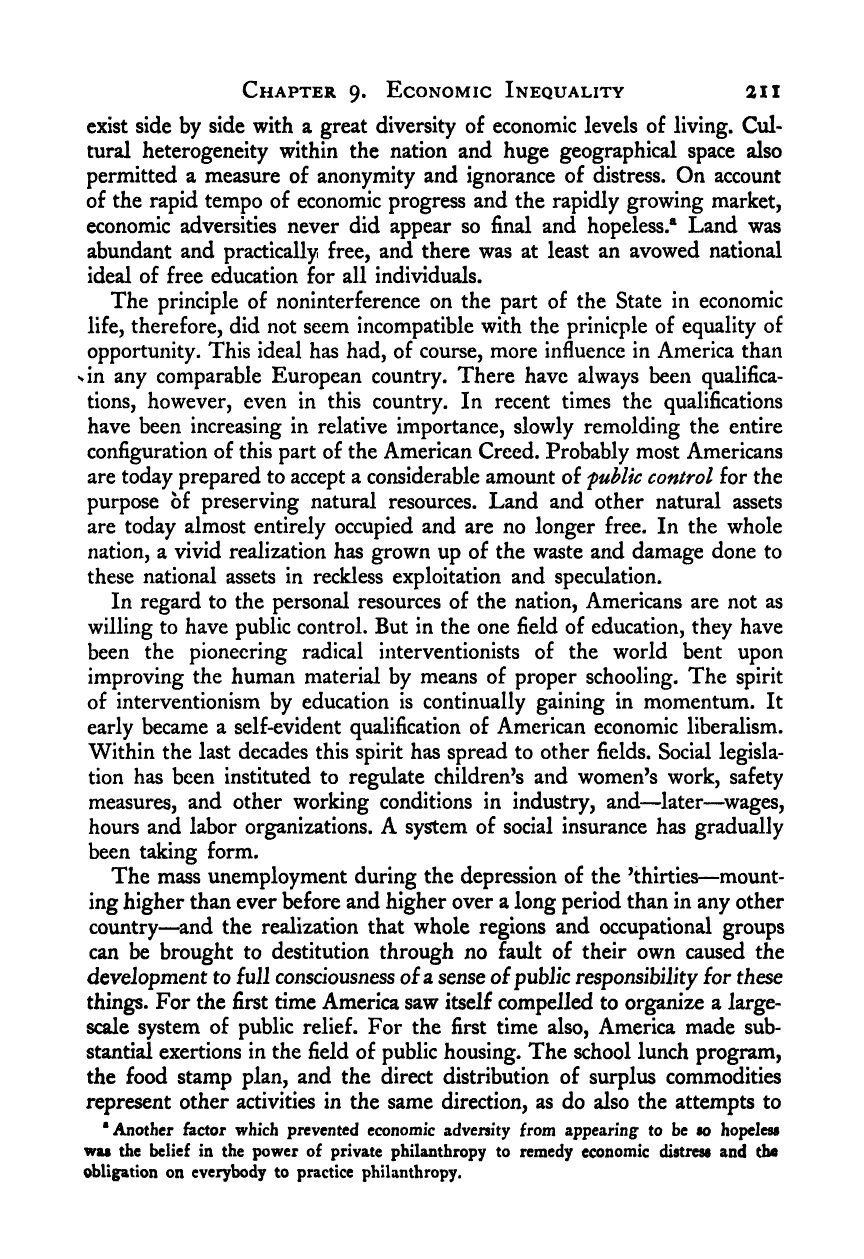Note: Gunnar Myrdal died in 1987, less than 70 years ago. Therefore, this work is protected by copyright, restricting your legal rights to reproduce it. However, you are welcome to view it on screen, as you do now. Read more about copyright.
Full resolution (TIFF) - On this page / på denna sida - IV. Economics - 9. Economic Inequality - 3. The Value Premises

<< prev. page << föreg. sida << >> nästa sida >> next page >>
Below is the raw OCR text
from the above scanned image.
Do you see an error? Proofread the page now!
Här nedan syns maskintolkade texten från faksimilbilden ovan.
Ser du något fel? Korrekturläs sidan nu!
This page has never been proofread. / Denna sida har aldrig korrekturlästs.
Chapter 9. Economic Inequality 2il
exist side by side with a great diversity of economic levels of living. C\il-
tural heterogeneity within the nation and huge geographical space also
permitted a measure of anonymity and ignorance of distress. On account
of the rapid tempo of economic progress and the rapidly growing market,
economic adversities never did appear so final and hopeless.® Land was
abundant and practically free, and there was at least an avowed national
ideal of free education for all individuals.
The principle of noninterference on the part of the State in economic
life, therefore, did not seem incompatible with the prinicple of equality of
opportunity. This ideal has had, of course, more influence in America than
sin any comparable European country. There have always been qualifica-
tions, however, even in this country. In recent times the qualifications
have been increasing in relative importance, slowly remolding the entire
configuration of this part of the American Creed. Probably most Americans
are today prepared to accept a considerable amount of puMic control for the
purpose of preserving natural resources. Land and other natural assets
are today almost entirely occupied and are no longer free. In the whole
nation, a vivid realization has grown up of the waste and damage done to
these national assets in reckless exploitation and speculation.
In regard to the personal resources of the nation, Americans are not as
willing to have public control. But in the one field of education, they have
been the pioneering radical interventionists of the world bent upon
improving the human material by means of proper schooling. The spirit
of interventionism by education is continually gaining in momentum. It
early became a self-evident qualification of American economic liberalism.
Within the last decades this spirit has spread to other fields. Social legisla-
tion has been instituted to regulate children’s and women’s work, safety
measures, and other working conditions in industry, and—later—^wages,
hours and labor organizations. A system of social insurance has gradually
been taking form.
The mass unemployment during the depression of the ’thirties—mount-
ing higher than ever before and higher over a long period than in any other
country—and the realization that whole regions and occupational groups
can be brought to destitution through no fault of their own caused the
development to full consciousness of a sense of public responsibility for these
things. For the first time America saw itself compelled to organize a large-
scale system of public relief. For the first time also, America made sub-
stantial exertions in the field of public housing. The school lunch program,
the food stamp plan, and the direct distribution of surplus commodities
represent other activities in the same direction, as do also the attempts to
‘Another factor which prevented economic adversity from appearing* to be so hopeless
was the belief in the power of private philanthropy to remedy economic distress and the
obligation on everybody to practice philanthropy.
<< prev. page << föreg. sida << >> nästa sida >> next page >>